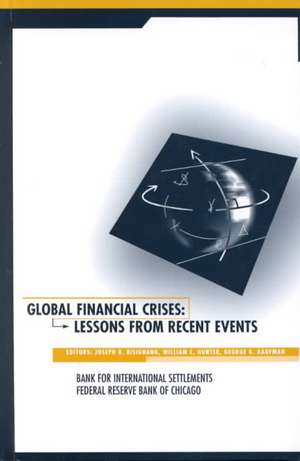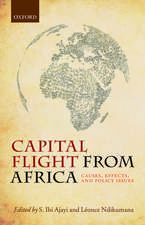Global Financial Crises: Lessons From Recent Events
Editat de Joseph R. Bisignano, William C. Hunter, George G. Kaufmanen Limba Engleză Hardback – 30 mai 2000
This book collects the papers and discussants' comments presented at a conference co-sponsored by the Federal Reserve Bank of Chicago and the Bank for International Settlements in Basel, Switzerland, and held in Chicago, in early October 1999. The purpose of the conference was to identify and discuss the lessons to be learned from these crises. Topics discussed included reviews of the crises in the individual countries and regions; analyses of the policy responses, both by the affected countries and by official international institutions; what has been learned from these crises; deposit insurance reform; the design of bank capital regulation; the role of bank supervision and regulation; and the future of official international financial institutions, such as the International Monetary Fund and the World Bank. The conference participants included a broad range of academic, industry, and regulatory experts from more than twenty-five countries.
Because of the timeliness of the conference and the wide-ranging expertise of the participants, the papers in this book should be of significant interest both to students of financial crises and to domestic and international policymakers.
| Toate formatele și edițiile | Preț | Express |
|---|---|---|
| Paperback (1) | 952.72 lei 6-8 săpt. | |
| Springer Us – 12 oct 2012 | 952.72 lei 6-8 săpt. | |
| Hardback (1) | 958.25 lei 6-8 săpt. | |
| Springer Us – 30 mai 2000 | 958.25 lei 6-8 săpt. |
Preț: 958.25 lei
Preț vechi: 1168.60 lei
-18% Nou
Puncte Express: 1437
Preț estimativ în valută:
183.42€ • 199.30$ • 154.17£
183.42€ • 199.30$ • 154.17£
Carte tipărită la comandă
Livrare economică 21 aprilie-05 mai
Preluare comenzi: 021 569.72.76
Specificații
ISBN-13: 9780792378655
ISBN-10: 0792378652
Pagini: 457
Ilustrații: XII, 457 p.
Dimensiuni: 155 x 235 x 32 mm
Greutate: 0.81 kg
Ediția:2000
Editura: Springer Us
Colecția Springer
Locul publicării:New York, NY, United States
ISBN-10: 0792378652
Pagini: 457
Ilustrații: XII, 457 p.
Dimensiuni: 155 x 235 x 32 mm
Greutate: 0.81 kg
Ediția:2000
Editura: Springer Us
Colecția Springer
Locul publicării:New York, NY, United States
Public țintă
ResearchDescriere
Since 1990, major banking and current crises have occurred in many countries throughout the world - including Mexico and Latin America in 1994-95, East Asia in 1997-98, and Russia and Brazil in 1998 - with large costs both to the individual countries experiencing the crises and to other nations. As a result, considerable effort has been expended by economists and policymakers to identify the causes of these crises and to design programs with the aim both of preventing similar crises from occurring in the future, and of minimizing the costs when these do occur. These studies have cut across national boundaries, being undertaken by individual researchers and organizations in particular countries, as well as by international institutions.
This book collects the papers and discussants' comments presented at a conference co-sponsored by the Federal Reserve Bank of Chicago and the Bank for International Settlements in Basel, Switzerland, and held in Chicago, in early October 1999. The purpose of the conference was to identify and discuss the lessons to be learned from these crises. Topics discussed included reviews of the crises in the individual countries and regions; analyses of the policy responses, both by the affected countries and by official international institutions; what has been learned from these crises; deposit insurance reform; the design of bank capital regulation; the role of bank supervision and regulation; and the future of official international financial institutions, such as the International Monetary Fund and the World Bank. The conference participants included a broad range of academic, industry, and regulatory experts from more than twenty-five countries.
Because of the timeliness of the conference and the wide-ranging expertise of the participants, the papers in this book should be of significant interest both to students of financial crises and to domestic and international policymakers.
This book collects the papers and discussants' comments presented at a conference co-sponsored by the Federal Reserve Bank of Chicago and the Bank for International Settlements in Basel, Switzerland, and held in Chicago, in early October 1999. The purpose of the conference was to identify and discuss the lessons to be learned from these crises. Topics discussed included reviews of the crises in the individual countries and regions; analyses of the policy responses, both by the affected countries and by official international institutions; what has been learned from these crises; deposit insurance reform; the design of bank capital regulation; the role of bank supervision and regulation; and the future of official international financial institutions, such as the International Monetary Fund and the World Bank. The conference participants included a broad range of academic, industry, and regulatory experts from more than twenty-five countries.
Because of the timeliness of the conference and the wide-ranging expertise of the participants, the papers in this book should be of significant interest both to students of financial crises and to domestic and international policymakers.
Cuprins
Acknowledgements. Preface. Part I: Opening Remarks and Keynote Addresses. 1. Opening Remarks; M.H. Moskow. 2. Lessons from the Asian Crisis; A. Crockett. 3. Lessons from Recent Global Financial Crises; L.H. Meyer. Part II: Review of Recent Financial Crises. 4. Latin America: No Fireworks, No Crisis? R. Hausmann. 5. The Asian Crises Revisited; M. Matsushima. 6. Lessons from Economies in Transition during the Recent Global Financial Crises; M.C. Medish. 7. The Financial Crisis in Russia; P. Sutela. Part III: Review of Policy Responses. 8. Monetary Policy to Resist Excessive Depreciation; M. Mussa. 9. Lessons from the Global Financial Crisis; J.E. Stiglitz. 10. Policy Responses to Global Financial Crises; E.M. Truman. 11. Restructuring Banking Systems; J. Hawkins. 12. Discussion of Policy Responses; A.J. Schwartz. Part IV: What Have We Learned from the Crises and Policy Responses? 13. Exchange Rate Overvaluation and Currency Crises: Lessons from Latin America and East Asia; S. Edwards. 14. Limiting Moral Hazard and Reducing Risk in International Capital Flows: The Choice of an Exchange Rate Regime; R.I. McKinnon. 15. What Have We Learned from Recent Financial Crises and Policy Responses? W.R. White. 16. The Korean Financial Crisis: Causes, Response, and Lessons; K. Kim. 17. Comment on Crises and Policy Responses; R.Z. Aliber. Part V: Redesign of Capital Regulations. 18. International Bank Capital Standards: Next Steps; R.E. Litan. 19. A Framework for Redesign of Capital Regulations; D. Nouy. 20. A Review of Proposals for Redesign of Capital Regulations; H.O. Ruding. 21. The New Regulatory Environment and the Need for Consistent Risk Measures for Financial Institutions; M. Crouhy. 22. The Roles of Banks, Supervisors, and the Market in Balancing Sensitivity and Stability; R. Himino. Part VI: Deposit Insurance Reform and Moral Hazard and Agency Problems. 23. Notes on Market-Based Bank Regulation; P.M. Garber. 24. Moral Hazard and Reform of the Government Safety Net; F.S. Mishkin. 25. Banks' Fragility and the Lender of Last Resort; J.-C. Rochet. 26. Moral Hazard and Reform of the Government Safety Net: A Comment; G. Caprio, Jr. 27. Moral Hazard in Banking: The Recent Argentine Experience; G.J. Escudé. Part VII: Nonbank Financial Institutions, Too Big to Fail, and State Ownership. 28. Financial Regulation, Prudential Supervision, and Market Discipline: Striking a New Balance; T.M. Hoenig. 29. Observations on Corporate Governance in the Asian Crisis; S. Johnson. 30. The Emerging Market Crisis and the Washington Consensus; D.A. Lipton. 31. Lessons of the Asia/Russia Financial Crises; C.M. Lucas. Part VIII: Role of Supervision and Regulation. 32. Making Financial Sector Supervision Work; P. Cantor. 33. Lessons from Recent Global Financial Crises; H. Evans. 34.






